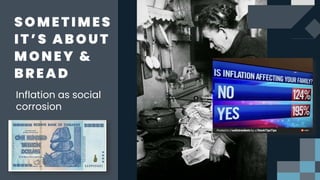Unrest to Uprising 2.pptx
- 1. DR. ROS ALIND W ARNER UNREST TO UPRISING 2023
- 2. Who am I? rowarner@okanagan.bc.ca Wordpress Blog: http://rozwarner.com/ Twitter: @rwarner23 ALL SLIDES AND SOURCES POSTED ON MY BLOG
- 3. Contents âĒ What is Protest? âĒ Through the Ages âĒ What Works/Doesnât âĒ What has Changed âĒ Uprisings of the Future
- 5. Through the Ages 01 02 03 04 05 06 Breaking Points Economics Elites Cycles of Discontent Natural Causes International Relations
- 6. THROUGH THE AGES Breaking Points
- 7. AARON TOBEY AND THE FOURTH AMENDMENT College student arrested for stripping down to reveal the Fourth Amendment written on his chest Sued the US government for violating his rights under â you guessed itâthe Fourth Amendment (âunreasonable searches & seizuresâ)
- 8. MUHA MME D BO UA Z IZ I âĒ Mohammed Bouazizi was a vegetable seller in a small town in Tunisia âĒ Routinely harassed by police for bribes, threatened, beaten, had his earnings stolen âĒ Went to the authorities to complain âĒ Set himself on fire in front of the govât building âĒ Public outrage spread throughout the Arab world
- 9. L OOTED MA NSIONS O F T UNISIA
- 11. SOMETIMES ITâS ABOUT BREAD Disastrous wars Serfdom & slavery Starvation The Russian Revolution 1917
- 12. SOMETIMES ITâS ABOUT MONEY & BREAD Inflation as social corrosion
- 14. IRA N: WA V E S O F PRO T E ST & C RA C KDO WN âĒ Periodic episodes of reform since 1990s under Khatami â 2009 Election of Mahmoud Ahmadinejad, âWomen Life Freedomâ today âĒ From Neda Agha-Soltan to Mahsa Amini âĒ Reformers called for democracy and social reform, closer ties with the West âĒ Reflected a division between reformers and the Supreme Leader
- 15. 1983 - Bennettâs Restraint Program seeks to abolish the Human Rights Commission ELITES MAKING HUGE MISTAKES
- 17. THROUGH THE AGES Cycles of Discontent
- 18. SIMULTANEOUS GLOBAL MOVEMENTS Environment Civil Rights Womenâs Liberation Peace Anti-Poverty Anti-Colonialism Human Rights The Vietnam War The Cold War Nuclear Threats Energy Crisis
- 19. EV OL UTION OF G RE E NPE A C E
- 21. THE FRENCH REVOLUTION & CLIMATE Little Ice Age âĒ1775 poor grain harvests, bread riots (Flour War) âĒLaki volcano erupted in June 1783 âĒCausing extremely volatile climate
- 23. THE FRENCH REVOLUTION AGAIN ïĄStates weakened by war undergo reforms, creating dissent. ïĄExample: France, 1789. War with England led to higher taxes and centralization, triggering revolt
- 24. THE J-CURVE A Revolution Borne of Rising Expectations
- 25. WHAT WORKS/DO ES ą·âT
- 26. SUCCESSFUL PROTESTS Womenâs suffrage Farmerâs Movements 01 02 03 US Civil Rights Movement
- 28. SUCCESS FA CTORS
- 30. EFFECT OF TECHNOLOGY Creates spectacle & performance âĒ Enables spread & learning âĒ Enables organizing, BUTâĶ. âĶit also helps both sides âĒ Facial ID enables arrest âĒ Social suppression
- 31. EFFECTS OF TECH
- 33. MARRYING TREES Over 70 women banded together to protect their local forest in the UK Protest to stop cutting of 74 mature trees in Bristol Each bride wore wedding dresses from a number of different cultures in a ceremony
- 36. THANK YOU
Editor's Notes
- #2: 1.7.2013
- #4: 1.7.2013
- #5: 1.7.2013
- #6: 1.7.2013
- #7: 1.7.2013
- #8: 1.7.2013
- #11: 1.7.2013
- #12: 1.7.2013
- #13: 1.7.2013
- #14: 1.7.2013
- #15: Presidential election of Mahmoud Ahmadinejad Reformers called for democracy and social reform, closer ties with the West Reflected a division between reformers and the Supreme Leader Periodic episodes of reform since 1990s under Khatami -more reform movements in 2003, then the election in June 2009âMoussavi vs. Ahmedinejad---a hotly contested election that pitted the regimeâs favourite against a reformer who called for greater attention to the the youth, unemployment, social reform, womensâ rights and better relations with the West  -Moussaviâs supporters called themselves Green revolution---green a strongly Islamic colour, called for democracy and social reform---  -June 12th the election results were announced at the Interior Ministry building in Tehran: with 85% participation in the vote, Ahmedinajad had 62.6% of the total, with Moussavi at 33.75%âprotestors claimed vote manipulation and rigging of the reusltsâwhich did not mathematically match with population patterns throughout the country, and results were announced before all of the polls had been physically counted  -also belied the intensity of the campaign, in which Moussavi supporters had filled the streets with mass demonstrationsâdemonstrators chanted âwhere is my voteâ?  "I assume that enemies intend to eliminate the sweetness of the election with their hostile provocation," he said in his televised address. He called the results a "divine assessment" and called on all the candidates to support the president.  ---Nationwide, the text messaging system crashed on Saturday and several pro-Mousavi Web sites were blocked or difficult to access. Text messaging is frequently used by many Iranians ÃĒÂâ especially young Mousavi supporters ÃĒÂâ to spread election news.   -police immediately attacked the demonstrators, who tried to set fire to the Interior Ministry  --On the night between the June 14 and 15, 15 students were severely injured by beating or killed when police and basij attacked Tehran University dormitories.[12] 120 faculty members of Sharif University of Technology resigned in protest of the alleged electoral fraud and began a protest against Ahmadinejad's re-election as President.[13]  -8 days following the announcement of the election results, Neda Agha-Soltan, 26, was at an anti-government demonstration in Tehran when she was felled by a single bullet to the chest.  -Agha-Soltan was taken to a nearby hospital and, within a day, she was buried at Behesht Zahra, the city's largest Muslim cemetery, on the outskirts of the capital. Immediately afterward, she emerged as the face of the anti-government movement.  --Iran's leaders called the uprising a foreign-led plot to overthrow the regime. It cracked down on the protesters -- with many killed and even more jailed.  --Images of the bloody crackdown fueled worldwide outrage. Agha-Soltan's pictures are still carried on placards at rallies outside Iran.  --Iranian authorities continue to deny that security forces were responsible for killing Agha-Soltan.  --Instead, they have offered at least three separate explanations. They have blamed the CIA, terrorists and supporters of the opposition movement themselves.  --One year after Agha-Soltan's death, Iranian officials have yet to announce a single arrest in connection with her killing.---show trails of demonstrators, many of whom were executed, began later in the summer What we commonly think of as means of control---Observation, use of force against people Targeted harassment, torture, killings---Or widespread purges, indiscriminate terror Inculcation of fear necessaryâatomize population Secret police as political tool to enforce â also an example of cooptation--- Method to bring individuals into an organization through beneficial relationship Making people dependent on organization for benefits Cooptation present (if suspect) in democracy, but widespread in nondemocratic rule ---in the case of Iran, most enforcement is done by the Basiji---first assembled by Ayatollah Khomeini during the war with Iraq---mostly young men & boys, inculcated with religious fervour, and sent to the frontlines to be the Islamic stateâs elite fightersâsimilar parallels with the Red Guard in China or the Young Soviets in Russia -the Basiji are the religious enforcers, the zealots taken at a young age and inculcated with religious fervour to work for the regime -the Revolutionary Guard are the older, professional fighters who train the Basijiâboth the Basiji and the Revolutionary Guard are closely aligned with Ahmedinejadâs interests--- -Khameini and others of the clerics are threatened by Ahme---worried by his command of the fighting elite---upcoming elections will tell the tale--- Â
- #16: 1.7.2013
- #17: 1.7.2013
- #18: 1.7.2013
- #19: 1.7.2013
- #21: 1.7.2013
- #22: 1.7.2013
- #23: 1.7.2013
- #24: 1.7.2013
- #25: 1.7.2013
- #26: 1.7.2013
- #27: 1.7.2013
- #28: 1.7.2013
- #29: 1.7.2013
- #30: 1.7.2013
- #31: 1.7.2013
- #32: By Jonathan Haidt: The high point of techno-democratic optimism was arguably 2011, a year that began with the Arab Spring and ended with the global Occupy movement. That is also when Google Translate became available on virtually all smartphones, so you could say that 2011 was the year that humanity rebuilt the Tower of Babel. We were closer than we had ever been to being âone people,â and we had effectively overcome the curse of division by language. For techno-democratic optimists, it seemed to be only the beginning of what humanity could do. In February 2012, as he prepared to take Facebook public, Mark Zuckerberg reflected on those extraordinary times and set forth his plans. âToday, our society has reached another tipping point,â he wrote in a letter to investors. Facebook hoped âto rewire the way people spread and consume information.â By giving them âthe power to share,â it would help them to âonce again transform many of our core institutions and industries.â In the 10 years since then, Zuckerberg did exactly what he said he would do. He did rewire the way we spread and consume information; he did transform our institutions, and he pushed us past the tipping point. It has not worked out as he expected.
- #33: 1.7.2013
- #34: 1.7.2013
- #35: 1.7.2013
- #36: 1.7.2013




































